FEATURE
Teaching the art and science of preaching
Louisville Institute postdoctoral fellow Kyle Brooks discusses his work at MTSO

At long last, MTSO has a molecular biologist teaching homiletics.
If you knew only that Kyle Brooks holds a bachelor’s degree from Yale in molecular, cellular and developmental biology, you could be forgiven for wondering how that degree – while laudable – has qualified him to prepare a new generation of preachers. There’s more to know, of course. Depending on which part of his life story you read, you might find his vocation shaping graduate theological students either mildly surprising or utterly obvious.
With the start of Fall Semester, Brooks began a two-year Louisville Institute postdoctoral fellowship as MTSO’s visiting assistant professor of homiletics and black church and African diaspora studies. The Louisville Institute, which supports those who lead and study North American religious institutions, chose Brooks for the award and approached MTSO about hosting him. The institute provides compensation, insurance, and housing and moving benefits.
This is far from Brooks’s first classroom position. After college, he taught high school biology. But in 2008, early in that career, he changed course dramatically.
“My shift toward theological education really was born out of crisis,” he said. “It came when I was 25, almost 10 years ago.” Earlier that year, his father had died young after a lengthy illness. Then Brooks endured a difficult breakup. The two events inspired him to reflect on the brevity and uncertainty of life.
“It wasn’t lost on me that at the point of my father’s death, I was half his age. At 24, who thinks of himself as middle age?” he said. He was left confronting “the recognition that none of us gets out of here alive.”
Further, before the breakup, “My mind was set on this particular future,” he said. So he asked himself, “Given that the future you imagined no longer is possible, what do you want to do right now?” The answer: “I want to go to divinity school, and I think I want to do it now.”
While the decision was abrupt, it didn’t come out of the clear blue. “I preached my first sermon when I was 6,” said Brooks, who grew up in the Church of God in Christ tradition and comes from generations of preachers on both sides of his family.
“My ability to be thoughtful and perceptive and articulate as a 6-year-old gave to many this sense that I was destined to do something powerful and meaningful as a preacher,” he said, while acknowledging, “This was also a highly gendered practice. Articulate little girls weren’t being pushed forward in the same way.”
In 2009, Brooks returned to Yale for a third time; he had earned an MA in Urban Education Studies in 2008 while teaching school in New Haven, Connecticut. He received his Master of Divinity degree from Yale Divinity School in 2012 and also won the school’s Jess H. and Hugo A. Norenberg Prize, awarded for excellence in preaching and leading corporate worship.
Brooks is now completing his dissertation in pursuit of a Vanderbilt University Ph.D. with a concentration in homiletics and liturgics, along with a minor concentration in practical theology. At Vanderbilt, he taught the course Black Religious Leaders from the Civil Rights Era to the Present in January of this year, and Preaching and Public Proclamation during Spring Semester.
Louisville Institute Executive Director Edwin Aponte approached MTSO Interim Academic Dean Valerie Bridgeman at the 2017 meetings of the American Academy of Religion and Society of Biblical Literature about the possibility of MTSO hosting a postdoctoral fellow. The two worked together to make it happen.
Bridgeman, who also serves as associate professor of homiletics and Hebrew Bible at MTSO, called Brooks “a wonderful person.” She first met him at a gathering in 2012. “He’s a great scholar, he’s a great thinker, and he’s an amazing poet. I’m looking forward to being part of his institutional development into the guild. We have two years of him shaping us and us shaping him.”
Brooks is energized by the unique challenges of teaching homiletics: “Teaching preaching does not allow me to settle into a pattern. It has taught me some good habits and practices to maintain, but it has also taught me that the best preaching practice does not come out of doing the same things you’ve always done. It comes out of an active response to a clear and thorough reading of your current situation.
“What I see in the text may not be what I see five years down the road, but that’s good. That’s growth.”
Methodist Theological School in Ohio provides theological education and leadership in pursuit of a just, sustainable and generative world. In addition to the Master of Divinity degree, the school offers master’s degrees in counseling, social justice, theological studies and practical theology, along with a Doctor of Ministry degree.
CONTACT:
Danny Russell, communications director
drussell@mtso.edu, 740-362-3322